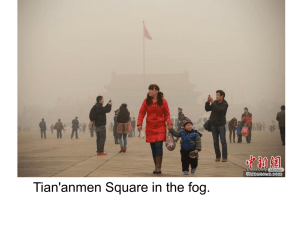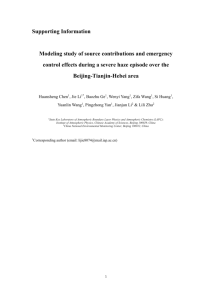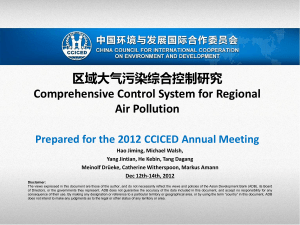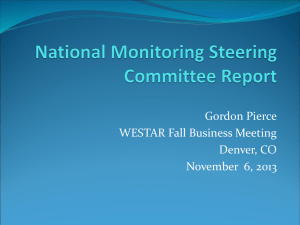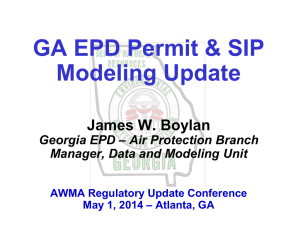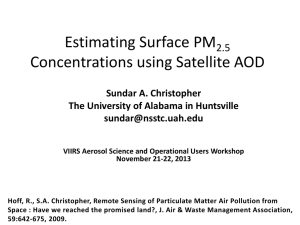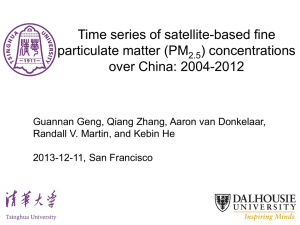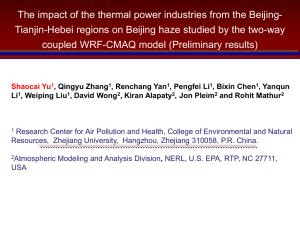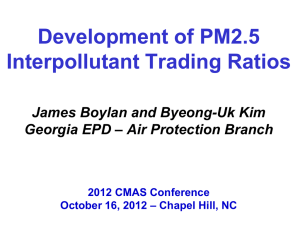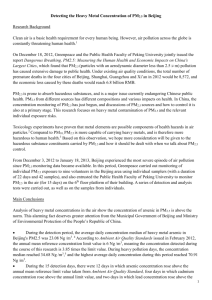大气污染防治行动计划 - 中国环境与发展国际合作委员会
advertisement
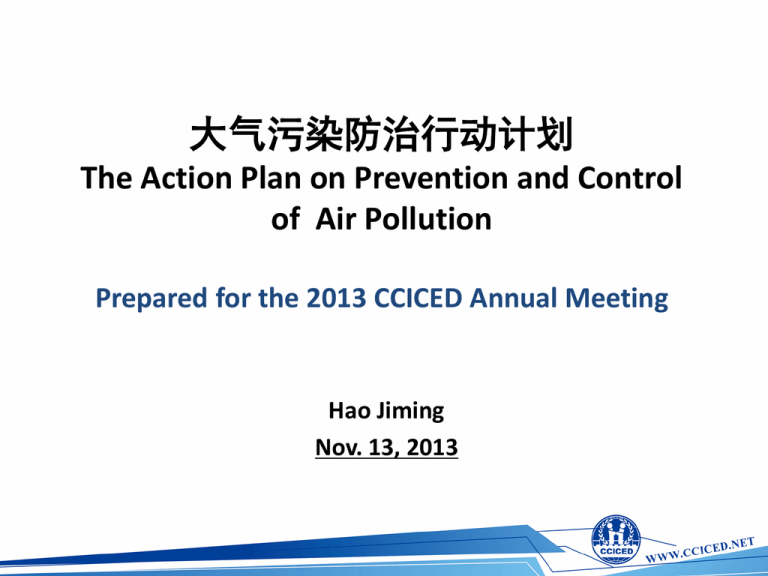
大气污染防治行动计划 The Action Plan on Prevention and Control of Air Pollution Prepared for the 2013 CCICED Annual Meeting Hao Jiming Nov. 13, 2013 提 要 Outline • 《行动计划》制定的背景 Background of the action plan • 《行动计划》的主要特色 Features of the action plan • 对加强大气污染防治工作的建议 Recommendations for future efforts 超过60%的城市不能达到新空气质量标准 Over 60% cities fail to comply with NAAQS (GB3095-2012) 2010-2012年平均浓度 2010-2012 annual concentration 2010-2012年平均浓度超标城市比例 Non-attainment cities 今年1月东部地区出现了长时间大范围的严重灰霾污染 Heavy haze pollution took place in Jan 2013 影响范围大 持续时间长 浓度高 暴露人口多 Area Duration Concentration Exposed population 130万平方公 里 3周 浓度爆表 超过8亿 Over 500 μg/m3 Over 800 million 1.3 million km2 ~3 week 全国城市环境空气中的颗粒物浓度距达标有明显差距 A wide gap between PM concentration and the standards 2013年上半年PM2.5浓度 PM2.5 concentration in the 1st half of 2013 空气质量标准 Standard •2013年上半年,三大区域仅有2城市能达到PM2.5年均值标准,京津冀平均浓度超标 高达3.3倍 •Only 2 cities in JJJ, YRD and PRD complied with the PM2.5 standards, and the average PM2.5 concentration in JJJ area is as 3.3 times high as the standard limit value. •2013年前三季度,实施新标准的74个城市中,仅有6个城市能达到PM2.5年均值标准 •Only 6 cities out of 74 (with PM2.5 measurements) complied with the PM2.5 standards 党中央和新一届政府高度重视大气污染防治工作 The Party and the government pays high attention on AP control •在第七次全国环保大会上对大气污染防治工作等提出明确要求 The requirements on air pollution control at the 7th National Conference on Environmental Protection •党的“十八大”提出建设生态文明和美丽中国的目标 •Promote ecological progress and build a beautiful country, from Report to the Eighteenth National Congress of the Communist Party of China •进一步加强空气污染防治,修订并发布空气质量标准,抓紧做好增加PM2.5 监测指标的准备,鼓励各地根据污染特征、经济发展水平等分期实施,逐步与 国际标准接轨。 •Strengthen air pollution control. Amend the new ambient air quality standard. Start to prepare PM2.5 monitoring. Integrate with international standard step by step. 政府制定行动计划,迅速响应了群众的关切 The government make swift response to public concern 人民关注 Public concern 专家建议 Recommendations 提 要 Outline • 行动计划制定的背景 Background of the action plan • 行动计划的主要特色 Features of the action plan • 对加强大气污染防治工作的建议 Recommendations for future efforts 1. 建立在国家战略高度的顶层设计 1. A top-level design featuring national strategy 奋斗目标 / Objectives 经过五年努力,全国空气质量总体改善,重污染天气较大幅度减少;京津冀、长 三角、珠三角等区域空气质量明显好转。 5 years: better air quality and much less heavy pollution days national-wide, and significantly improved air quality in JJJ, YRD and PRD. 力争再用五年或更长时间,逐步消除重污染天气,全国空气质量明显改善 Another 5 years or more: eliminate heavy pollution episodes, and significantly improved air quality national-wide . 具体指标/Indicators for the next 5 years 到2017年,全国地级及以上城市in PM10比2012年下降10%以上,优良天数逐年提 高。 10% reduction in PM10 concentration national-wide . 京津冀、长三角、珠三角等区域细颗粒物浓度分别下降25%、20%、15%左右, 其中北京市细颗粒物年均浓度控制在60微克/立方米左右。 25%, 20% and 15% reduction in PM2.5 concentration for JJJ, YRD and PRD respectively. Annual concentration of PM2.5 to be around 60 μg/m3 . 2. 突出了分区控制,分类指导的思想 2. Differentiated targets for different regions 晋蒙鲁:支持京津冀实 现目标 Shanxi-Shandong-Inner Mongolia: support JJJ 京津冀:PM2.5浓度下 降25% JJJ: 25% reduction on PM2.5 concentration 长三角:PM2.5浓度下 降20% YRD: 20% reduction on PM2.5 oncentration 其他:PM10浓度下降10% Others: 10% reduction on PM10 concentration 珠三角:PM2.5浓度下降 15% PRD: 15% reduction on PM2.5 concentration 3. 关注了大气污染产生的重要因素: 加快产业结构调整 3. Speed up industrial restructure to reduce emissions SO2、NOX、烟粉尘和VOCs排放量符合要求成为环评审批前置条件 EIA for new projects constrained by emissions budget of SO2, NOX, PM and VOCs 提高环保、能耗、质量等标准,促进“两高”行业过剩产能退出 Higher standards on emissions control, energy saving and product quality to promote elimination of outdated high-pollution capacity 提前一年完成“十二五”期间21个重点行业的落后产能淘汰目标任务 Achieve the 12th FYP eliminating goal for 21 sectors one year earlier 3. 关注了大气污染产生的重要因素: 加快能源清洁利用 3.Speed up supply and use of cleaner energy 优化能源结构/Better energy structure • 2017年,全国煤炭比重降低至65%以下;京津冀、长三角、珠三角煤 炭消费量负增长 • Lower the ratio of coal to national energy consumption to 65% or below by 2017. Reduce coal consumption in JJJ, YRD and PRD 推进煤炭清洁利用/Cleaner use of coal • 到2017年,原煤入选率达70%以上;减少原煤散烧 • 70% or more raw coal to be washed by 2017. Restrict use of raw coal by small boilers and stoves 增加清洁能源供应/More supply of cleaner energy • 新增天然气干线管输能力1500亿立方米以上 • New NG transmission pipeline with capacity over 150 billion cubic meter 3. 关注了大气污染产生的重要因素: 加快能源清洁利用 3. Speed up supply and use of cleaner energy 新增加1500亿立方天然气供应量,如果 用于替代部分燃煤工业锅炉耗煤,预计 可减排:SO2 359-579万吨;NOx 60-160 万吨;烟尘 134-272万吨。 If additional supply of natural gas (about 150 billions m3) is used to replace part of coal fired industrial boilers (e.g. less than 20 t/h), the potential of pollutants reduction will be SO2 3.59-5.79 Mt, NOx 0.6-1.6 Mt, PM 1.34-2.72 Mt。 排放因子 Emission Factor SO2 NOx PM 备注 Remark 燃煤工业锅炉 industrial coal10-16 3-5.7 3.8-7.5 fired boiler kg/t 燃气工业锅炉 industrial gasfired boiler kg/10k·m³ 5.53 33.15 2.21 燃气工业锅 炉新标准 New standards of industrial gas-fired boiler 3. 关注了大气污染产生的重要因素: 加快能源清洁利用 3. Speed up supply and use of cleaner energy 热电联产替代工业锅炉减排显著 Emission reduction of combined heat and power generation replacing industrial boiler 排放因子 Emission Factor 数值 Number SO2 NOx PM 燃煤工业锅炉 industrial coal10-16 3-5.7 3.8-7.5 fired boiler kg/t 热电联产 combined heat 1.54 2.67 0.35 and power generation kg/t 备注 Remark 经测算,20t/h以下燃煤工业锅炉的耗煤 量约为2.66亿吨。 根据等量置换原则,计算污染物减排潜力, 预计可减排:SO2:234-394万吨,NOx: 25-97万吨,烟尘:93-193万吨. If part of coal fired industrial boilers(eg. <20 t/h) is equivalently replaced by thermoelectric coal fired units, the possible pollutants reduction will be: SO2: 2.34-3.94 Mt, NOx: 0.25-0.97 Mt, PM: 0.9-1.93 Mt, if reaching the new emission standard 3.关注了大气污染产生的重要因素: 强化机动车污染防治 3. Enhance vehicle emissions control 控制大城市机动车保有量/Control vehicle inventory of big cities • 北京、上海、广州等特大城市严格限制机动车保有量 •Control vehicle population of megacities strictly, such as Beijing, Shanghai, Guangzhou 提升燃油品质/Improve fuel quality •2015年底前,京津冀、长三角、珠三角等区域内重点城市供应硫含量不大 于10ppm的车用汽、柴油;2017年底前,全国供应硫含量不大于10ppm的车 用汽、柴油 •Gasoline and diesel with 10ppm sulfur content by the end of 2015 for key areas, and by the end of 2017 for others. 加快淘汰黄标车/Speed up the elimination of yellow label vehicles • 到2015年,基本淘汰京津冀、长三角、珠三角等区域内的500万辆黄标车。 到2017年,基本淘汰全国范围的黄标车 •Eliminate 5 million yellow label vehicles in JJJ, YRD and PRD by 2015, and eliminate yellow label vehicles in the whole nation by 2017. 3.关注了大气污染产生的重要因素: 强化机动车污染防治 3.Enhance vehicle emissions control 加强机动车环保管理/Enhance environmental management of vehicles •加强在用机动车年度检验,对不达标车辆不得发放环保合格标志,不得上路行驶 •enhance vehicles annual inspection. substandard vehicles are forbidden to grant qualified environmental label and run on road. 加快推进低速汽车升级换代/Advance upgrade and update of low speed vehicles • 自2017年起,新生产的低速货车执行与轻型载货车同等的节能与排放标准 •New production low speed trucks carry out the same energy conservation and emission standard with light duty trucks since 2017. 大力推广新能源汽车/Generalize new energy vehicles • 公交、环卫等行业和政府机关要率先使用新能源汽车,鼓励个人购买。北京等城市每年 新增或更新的公交车中新能源和清洁燃料车的比例达到60%以上 •Promote new energy vehicles in public transportation and service, and encourage personal purchase with financial subsidies. The proportion of new energy clean fuel vehicles from new buses of Beijing, Shanghai, Guangzhou reached 60% . 4. 体现了4个重要转变 4. Evolvement of philosophy on air pollution control 控制目标 Goal 控制对象 Pollutants 控制手段 Sectors 管理模式 Approach 总量控制 Emissions 硫、氮、尘 SO2/NOX/ smoke 工业点源和机 动车 Point sources and vehicles 属地管理 Territorial management 质量改善 Air quality 多种污染物 Multipollutants 多污染源综 合控制 Multi-sectors 区域联防联控 Territorial management+ regional cooperation 多污染源、多污染物的综合控制 Integrated air pollution control by multi-sector and multi-pollutants approach 固定源 Stationary point sources 移动源 Mobile sources 面源 Area sources (Power plants, industrial sources, etc.) (On-road & off-road) (Commercial, residential, natural) SO2 PM PM2.5 公共健康 Public Health NH3 NOx Acid rain O3 能见度 Visibility VOC 气候 Climate 生态系统 Eco-system 京津冀、长三角区域联防联控工作协调机制 Regional collaboration mechanism for JJJ and YRD 国务院 有关部门 Ministries 省级 人民政府 Provincial governments 协调解决区域内突出环境问题 Coordinate 组织实施环评会商、联合执法、信息共享 、预警应急等工作 Organize impact assessment, enforcement, info sharing and emergency response 通报工作进展 Deliver progress report 研究确定阶段性工作要求、工作重点和主 要任务。 Develop stage implementation plans and tasks 5. 针对京津冀提出了特别要求 5. Rules for the implementation of action plan in JJJ 京津冀+晋蒙鲁 Beijing-Tianjin-Hebei + Shanxi-Inner Mongolia-Shandong 高于全国平均水平的污染治理要求 Higher standards on pollution abatement performance 强化钢铁、水泥等行业的落后产能淘汰 Extra requirements on phasing out backward processes in iron & steel and cement industries 煤炭消费总量减少8300万吨 Coal consumption to reduce by 83 million tons 强化联防联控和监督考核机制 Highlighted regional collaboration, supervision and evaluation 地区制定针对性的措施:(1)北京清洁空气行动计划 Beijing’s action plan for clean air 8大污染减排工程:源头、能源、交通、产业、末端治污、城市精细化管 理、生态、应急 Emission control measures addressing 8 aspects: city’s capacity, energy, transportation, economic structure, end-of-pipe control, fugitive source, ecology, and emergency response 6大实施保障措施:法规体系、经济政策、科技支撑、组织领导、落实责 任、考核问责 Supporting measures from 6 directions: legislation, economic policy, science & technology, organizing, clear responsibility and assessment 三大全民参与行动:企业自律、公众自觉、社会监督 3 campaigns to encourage involvement: enterprise self-discipline, public participating and public supervision 地区制定针对性的措施:(2)上海清洁空气行动计划 Shanghai’s action plan for clean air 目标:2015年PM10达标,SO2、NO2年均浓度在国家要求基础上进一步下降, PM2.5年均浓度控制在50微克/立方米;2017年,PM2.5年均浓度比2012年下降 20%以上 Targets: 2015, PM10 , SO2 and NO2 (equal or better than NAAQS) , PM2.5: 50 ug/m3; 2017, PM2.5 20% lower than in 2012, other pollutants meet the NAAQS. 措施:(一)优化能源结构,深化燃煤污染防治 (二)加快产业结构调整,加强工业污染防治 (三)积极发展绿色交通,加大机动车船污染控制力度 (四)规范建设行业管理,提升污染防治水平 (五)强化农业污染治理,减少面源排放 (六)推进社会生活源整治,加快VOCs等污染治理 Emission control measures addressing 6 aspects: energy, economic structure, end-of-pipe control, transportation, agriculture source, area source, and VOCs control 提 要 Outline • 行动计划制定的背景 Background of the action plan • 行动计划的主要特色 Features of the action plan • 对加强大气污染防治工作的建议 Recommendations for future efforts 达到既定目标任务艰巨,需要付出巨大努力 A very large challenge calls for enormous efforts 为达到既定目标,需要多污染物减排幅度远超过远超过以往任何时期 Sharper emission reductions of air pollutants (than 11th FYP and 12th FYP) needed in order to meet the air quality target 污染物减排目标百分比的比较 Emission reductions needed for action plan vs. 11th and 12th FYP SO2 NOX PM VOCs (to guarantee) action plan >15% >20% >20% >7% 12th FYP >8% >10% N/A N/A 11th FYP >10% N/A N/A N/A 三大重点区域所需实现的减排比例更高 Much more reductions needed in the three key regions (JJJ, YRD and PRD) 建议1:进一步强调节能对大气污染防治的协同效益 Recommendation 1: pursue co-benefits from energy saving 提高工业生产过程中的能 源利用效率 To boost energy efficiency of industrial producing 加强材料研发和管理,强 化建筑节能 To enhance building energy conservation with new material and good management practice 减少交通油品消耗 To reduce fuel consumption in transportation sector 中国工业产品能耗与国际先进水平的差距 Gap of energy efficiency in industrial sector 单位能耗 Energy efficiency (kgce/t) 中国 China 钢铁 Steel producing 625 550 13.6 水泥 Cement producing 151 118 28.0 乙烯 Ethylene producing 1003 629 59.5 国际先进 International Gap (%) advanced level 建议2:科学谋划,有序推进城镇化 Recommendation 2: continue urbanization with scientific plan 在城镇化过程中考虑产业和能源调整要求:严格产业准入,控制落后产能扩 张;强化基础设施建设,保障清洁能源供给 To prioritize demand of industrial and energy restructure during urbanization: Restrict entry of outdated industrial process, and secure supply of cleaner energy 科学进行城市规划:合理规划城市规模,慎重发展千万人口级的城市;控制 城市煤炭消费量,以减少燃煤污染 To scientifically make urbanization plan: Restrict the scale of the cities, and develop cities with 10 million population with discretion; Control use of coal and according pollutions 合理规划城市布局:优化交通系统,以减少机动车污染 Formulate the city layout: optimize the public transportation and reduce vehicle emissions 关注O3污染问题:随着对PM污染控制的逐渐深入,关注重点区域日益严重 的O3污染问题 To pay attention to O3 pollution: Prepare for actions to address O3 pollution, especially for the key regions. 建议3:进一步推进移动源污染防治 Recommendation 3: further efforts to control mobile emissions 妥善应对机动车保有量快速 增长的压力 To curb emissions with fast growth of vehicle population 机动车快速增长在很大程度上抵消了减排成果 Emission reduction offset by increase of vehicle population 积极推动非道路移动源污染 防治。 Promote pollution prevention of non-road mobile source positively 交通需求还将大幅增长 Great potential on transportation demands 建议4:空气质量改善需要长期持续努力,并循序渐进 Recommendation 4: A long-term strategy needed for AQ improvement Establish Goals Determine Emission Reduction Targets 建立环境目标 确定减排目标 Scientific Research 科学研究 Control Strategies 控制措施 On-going Evaluation 跟踪评估 Implementation Programs 项目实施
